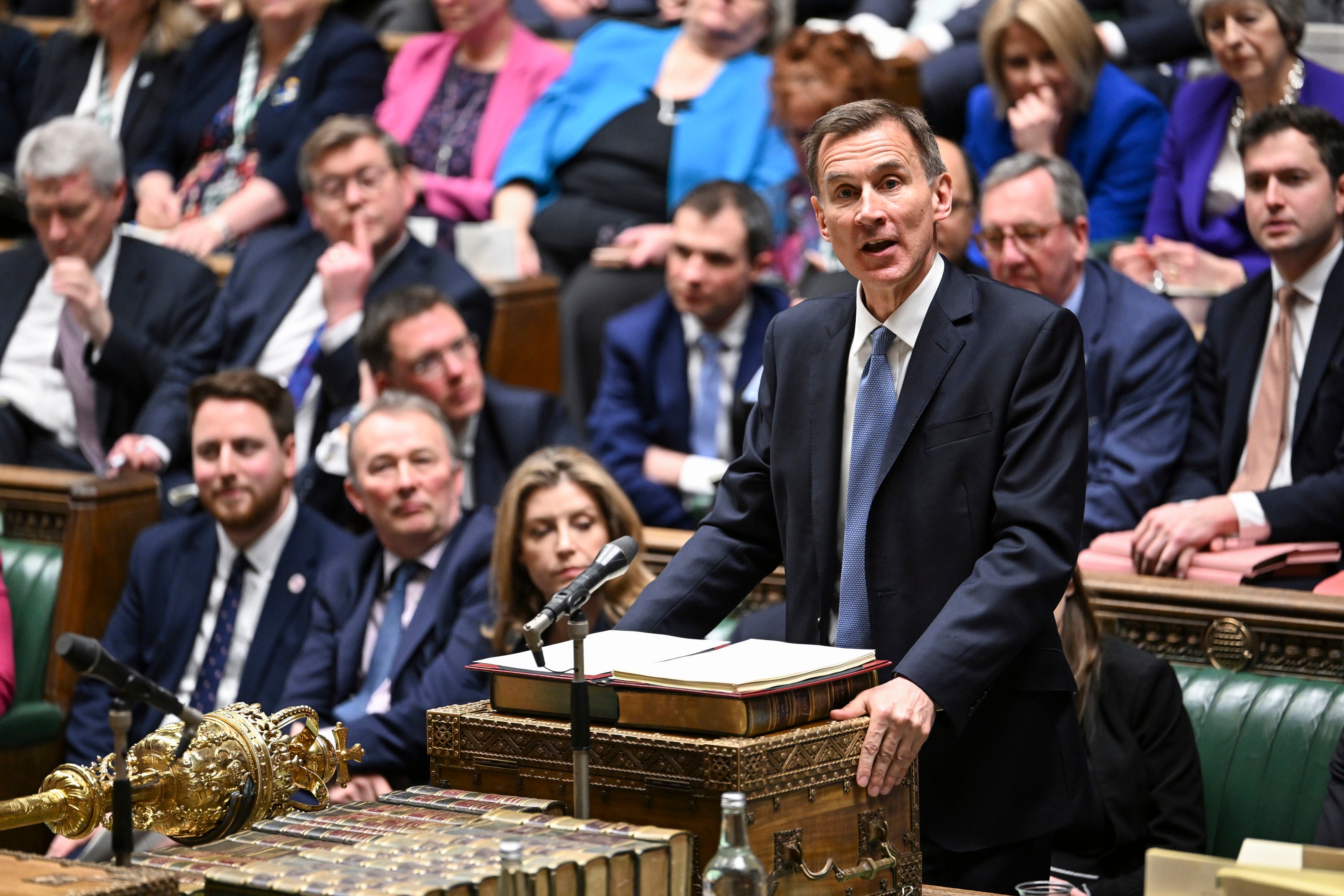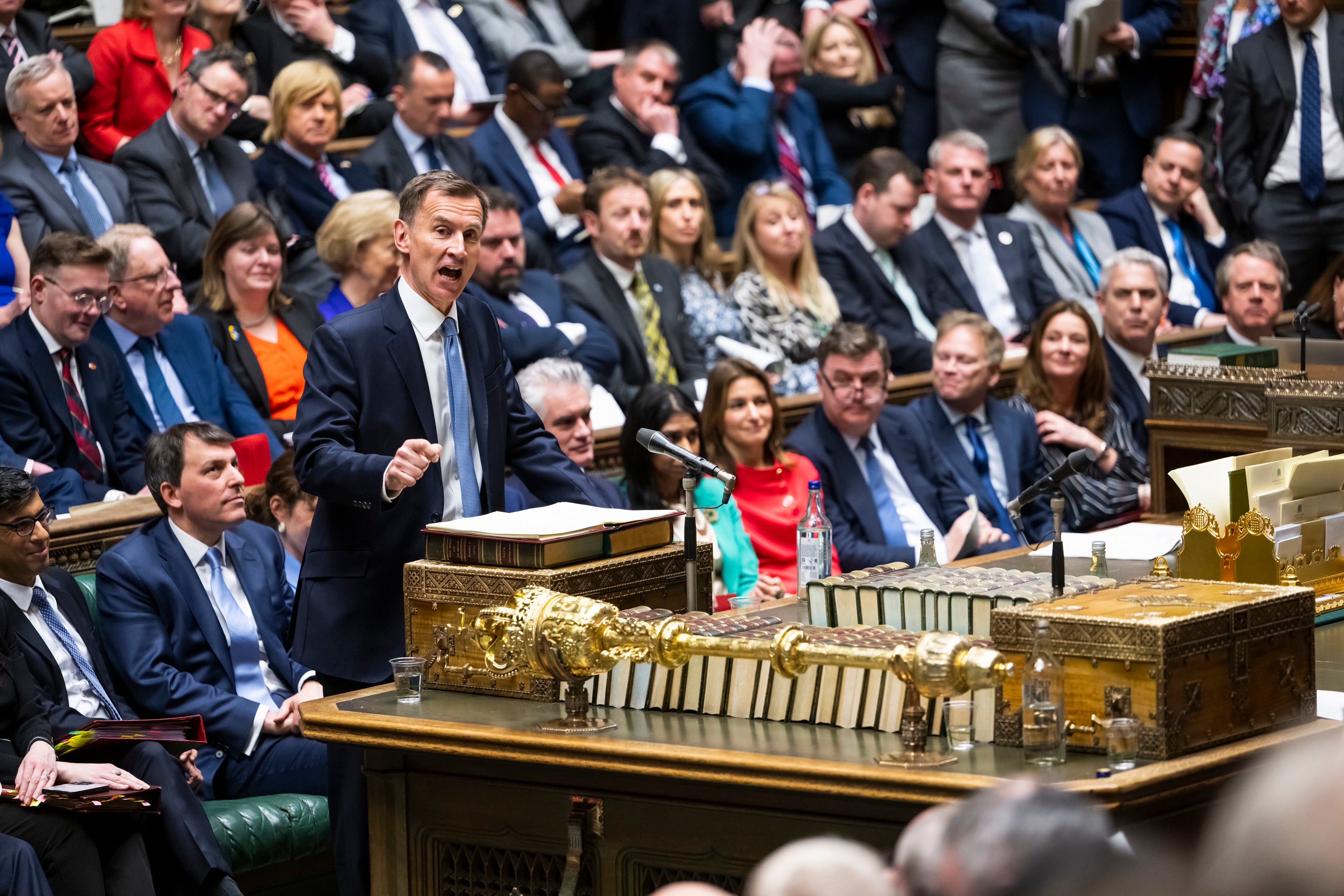
The chancellor has announced the “biggest change to our welfare system in a decade”, with reforms aimed at supporting more disabled people and jobseekers back into work.
In his Budget announced on Wednesday in the Commons, Jeremy Hunt said the UK was “proving the doubters wrong” and his sweeping policy changes would “improve the economic picture”.
On benefits, the chancellor announced the system used to assess eligibility for sickness benefits will be scrapped, while parents on universal credit will be paid childcare support up front as well as reforms to job seekers on universal credit.
The chancellor made a nod to reforms introduced by Sir Iain Duncan Smith when he was work and pensions secretary, telling the Commons: “The number of disabled people in work has risen by two million since 2013.
“But even after that we could fill half the vacancies in the economy with people who say they would like to work despite being inactive due to sickness or disability. With Zoom, Teams and new working models that make it easier to work from home this is more possible than ever before.
“So for that reason, the ever-diligent work and pensions secretary, today takes the next step in his ground-breaking work on tackling economic inactivity,” he continued. “I thank him for that, and today we publish a White Paper on disability benefits reform. It is the biggest change to our welfare system in a decade.
“His plans will abolish the Work Capability Assessment in Great Britain and separate benefit entitlement from an individual's ability to work. As a result, disabled benefit claimants will always be able to seek work without fear of losing financial support.”
The chancellor also revealed sanctions reforms aimed at getting people on Universal Credit benefits into work.
After claiming that “independence is always better than dependence” to jeers from the SNP, Mr Hunt said sanctions will be applied more rigorously to those who fail to meet strict work-search requirements or choose not to take up a reasonable job offer.
The new regime means for people working low hours, the government will increase the Administrative Earnings Threshold from the equivalent of 15 hours to 18 hours at National Living Wage for an individual claimant.
This means anyone working below this level will receive more coach support alongside a more intensive conditionality regime.

What are the main changes?
- The system used to assess eligibility for sickness benefits will be scrapped
- Parents on universal credit will be paid childcare support upfront
- Stricter sanctions for jobseekers on universal credit
When do these policies come into effect?
For job seekers on universal credit, of which there are more than two million impacted, the new sanctions will be soon incoming after today’s announcement.
According to the work and pensions department, the changes will begin in Spring 2023 with the addition of extra coach support in selected job centres before spreading further through the country in 2024.
On the abolition of the system used to assess eligibility for sickness benefits, Mr Hunt said a White Paper has been published but will require primary legislation, which the department is aiming to take early in a new Parliament - so Spring 2023.
Under the new system, there will only be one health and disability assessment for people claiming Personal Independent Payment (PIP) with the changes possibly impacting some 2.5 million people.
A new Universal Credit “health element” will be awarded to claimants of PIP, “ensuring there is a safety net in place for the most vulnerable”, the white paper says.
The government will also pay the childcare costs of parents on universal credit moving into work or increasing their hours upfront, rather than in arrears with the changes coming into effect from autumn this year.

How have experts reacted?
James Taylor, executive director of strategy at disability equality charity Scope, welcomed the ditching of the WCA, but warned there have been “many mistakes” on welfare reform in the past and that concern among those out of work due to disability will remain.
He said the government “must make sure it doesn't replace one out-of-touch test with another” and insisted that “you can't sanction disabled people into work”.
Mr Taylor added: “The government has got a mountain to climb to win back the trust of disabled people. For far too long, disabled people have been faced with degrading benefits assessments, cruel sanctions and a dearth of tailored support to find suitable jobs.
“Disabled people face major barriers getting into work, such as discrimination from employers and long delays getting the right support. There is much work for the Government to do to get this right and rebuild trust.”
Imran Hussain, director of policy and campaigns at Action for Children, welcomed a shift in tone from the Government on getting people back into work, but said the living standards of those who cannot work must be protected.
Mr Hussain said: “Today's Budget has gone some way but not far enough to help the parents of the almost two million UK children on the breadline we've identified who still face enormous obstacles to working their way out of hardship.
“We hope this marks a shift in the government's thinking that work is the route out of poverty to also now recognising there are very real structural barriers like disability and caring duties preventing people working, as our analysis shows.”







